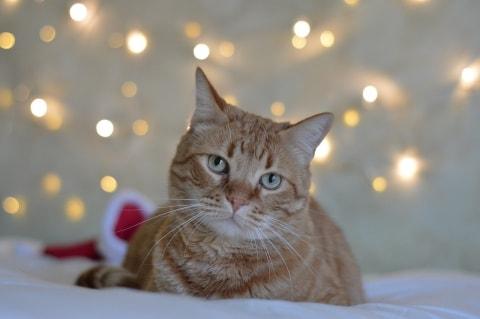Of course, we all love to share the joys of the Christmas season with our pets. But it's worth remembering that household hazards do really increase at this time of the year. So pay extra attention to these 5 dangers around the home during December - here's how you can prevent the worst from happening, so you and your pets can have a safe and merry Christmas.
1. Dangerous foods
Christmas is all about the food, but remember there are certain nutrients that can be super dangerous for dogs and cats. Be careful with chocolate, raisins, grapes and macadamia nuts: these are toxic to our furry friends. Alcohol is also potentially very dangerous: an excessive intake can even lead to a coma. So keep those tempting drinks up high where your curious pets can't reach them.
Most leftovers from our human meals aren't healthy for your pet. Cooked meat is usually far too fatty and salty for our pets to safely consume. Additionally, the bones of cooked meat can splinter in your pet's stomach. So don't ever give your dog or cat a treat from your plate - instead, give them a tempting pet treat made from dried meat or a chew treat. And don't forget to take out the garbage as soon as it fills up: sneaky cats and dogs might search the garbage bags and eat something nasty while your back is turned.
Sugar isn't good for your pet, but be even more cautious when it comes to sugar substitutes. Xylitol is a sweetener that is often found in sugar-free chewing gum and mints. Often these types of sweets might be hidden around the house at Christmas time or in the bags of guests coming to visit you. Other toxic items such as make-up and medicines might also be found in visitor handbags. Therefore, ask your guests to leave their bags in a locked room or cupboard where your pet can't reach.
Tip: be sure your guests know to not give your pet any unhealthy treats when they come around to visit. Read more about preventing begging.
2. Flowers and plants
Christmas star, mistletoe and holly are poisonous for your pet, so keep them well out of reach, or rather do not have them in the house at all. Many vase flowers are also dangerous - lilies are one particular culprit to look out for. Lily poisoning can easily happen if your cat licks a few grains of pollen or nibbles on a petal, and sadly the outcome can be fatal. Do not buy lilies if you can avoid them, and definitely keep them far away from where your cat can access.
Read about which plants are toxic to pets
If you opt for a real Christmas tree, be aware that the fallen pine needles can also be toxic to your pets. So make it a habit of sweeping the floors every day. Is your Christmas tree in a container with water? The water can become contaminated by the tree and any plant food you might add to keep it fresh, so make sure your pet can't reach the water to drink it.

3. Christmas lights & decorations
We love our twinkly Christmas lights in New Zealand, both indoor and outdoor! However, these can pose a danger to curious dogs, rabbits, rodents or kittens and puppies that love to chew on new things. Be sure to keep the cables out of reach and turn off all Christmas lights as soon as you leave the room.
Christmas decorations such as garlands, glitter, baubles and other small items can really spike your pet's curiosity. Cats, in particular, may want to play with your Christmas decorations, which can break and splinter into sharp, hazardous pieces. Additionally, garlands, string and other longer decorations can cause blockages in the intestines if consumed. Be extra aware of your curious cat, who might like to climb your tree and explore all the exciting shiny things.
Spray snow is also a synthetic substance that may look great, but is dangerous for your pet. For your peace of mind, consider buying or DIYing ecological or natural Christmas decorations - a much safer option for your pet and better for the environment!
4. Fireworks
Fireworks around new year's eve, as well as Christmas crackers, candles and other fireworks can super scary for your pet. Make absolutely sure that your furry friend is at a safe distance from these loud noises at all times. If you want to read how to deal with anxious pets and fireworks, read here.
5. Stress
During the summer holidays our pets are often exposed to extra stress: for instance, we often have less time for them, we have guests coming over, guests might bring their dog over to dinner parties, our pet's daily routine is disturbed and so on. Therefore, pay close attention to your pet during this busy time of year. Go for a walk during the day with your dog to help it burn some energy, make sure your cat receives enough play and cuddle time and always provide a quiet place where your pet can chill out.
Tip: Do you have a busy schedule coming up? Do you have visitors coming over, leaving less time to spend with your pet? Then book a pet sitter to give your dog or cat some extra attention while you're busy. And on new year's eve, you can also bring your pet to a loving pet sitter in a quiet neighbourhood without fireworks. But get in soon, as our pet sitters are busy during this peak season!




